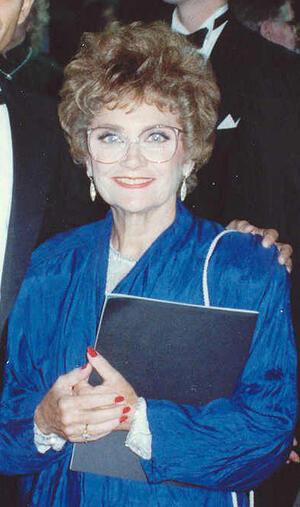Estelle Getty: Golden Girl
Actress and comedian Estelle Getty (1923 – 2008) at the 41st Emmy Awards held on September 17, 1989.
Photo: Alan Light.
We Remember Estelle Getty: by Beth Kander
Do I admire her because she's been described as "... evasive about her height, acknowledging only that she was under 5 feet and under 100 pounds?" Well, all the more points to Estelle Getty for being an itsy-bitsy powerhouse, but mostly I admire her for being a genuinely funny, talented woman, who never gave up on her greatest ambitions. In an industry where youth and beauty are often valued far above maturity and wit, Estelle turned the tables. She found success in her later years, cracked wise about it the whole time, and taught young women like myself a few things along the way.
Estelle's story is not a typical Hollywood fable. Born Estelle Scher on July 25, 1923, on the Lower East Side of Manhattan in New York City, she was the daughter of Polish-Jewish immigrants who worked in the glass business. As a child, she adored vaudeville, and was determined to be an actress; she took up dance, singing, tried to make it in Yiddish theater and as a comedian in the Catskills "borscht belt" – and she failed. In December 1947, at age 24, she married New York businessman Arthur Gettleman (and later used a derivative of her married last name for the stage). She raised two sons, kept house, and worked as a secretary ... but she never gave up her dream of the stage.
For decades, while working and parenting, community theater was her primary outlet for her stage dreams. Years passed, but a desire still burned within Estelle. In the 1970s, when she was already in her fifties, she formed a deep friendship with actor/playwright Harvey Fierstein – and when he wrote the autobiographical show Torch Song Trilogy, he cast her as his mother. Ultimately, the show made it to Broadway; Estelle won a Helen Hayes Award, national acclaim, and long-awaited recognition over the course of her five year run with Torch Song Trilogy.
It was the "Torch" that shined the way to Estelle's "Golden" opportunity. When she first auditioned for the role of sharp-witted, unapologetic Sicilian octogenarian Sophia Petrillo, she was told she was too young [Estelle was, in fact, more than a year younger than Bea Arthur, who played Sophia's daughter Dorothy]. But Estelle wasn't letting this role pass her by. She got herself a gray wig, old-age makeup, and dowdy old-woman clothes, and made sure NBC knew that she was the one for Sophia. She was right. She wound up not only getting the part, but also getting seven consecutive Best Supporting Actress Emmy Award nominations for her role as Sophia, finally snagging a win in 1988. Sophia led to several other snarky-senior roles for Getty. Finally, in her sixties and seventies, little Estelle Scher's lifelong dreams were coming true.
Estelle Getty became a bonafide star. She then used her fame to further her social activism, which also blossomed late in her life. When her nephew fell victim to AIDS, Estelle became a dedicated AIDS and gay rights activist. The small woman took on big adversaries, and never backed down.
I didn't know any of that when I watched her on The Golden Girls. I just thought she was a riot. I was a child in the show's heyday, but I loved it ... mostly because both of my grandmothers loved The Golden Girls. I remember watching it with both of them – and at the time, being scandalized about how often the show's senior stars talked about sex, and how much those jokes appealed to my own grandmothers! My two grandmothers differ greatly from one another: one is a tiny Jewish woman, born in Czechoslovakia; the other, a Polish/Spanish Christian woman, hailing from rural America. In their own ways, both of my grandmothers were women who struggled, were a product of their times – but never backed down. Estelle encompassed and appealed to them both.
Now, as a grown woman myself, I am inspired by these women. By my grandmothers. By Estelle Getty. When I heard the NPR news story about her death after a long struggle with dementia, my heart ached; how much must it have devastated a woman with as much tenacity as Estelle to have her very self eroded by dementia? And so I cling to her legacy, and will use it to make her memory a blessing. Estelle epitomizes possibility: she became an award-winning actress late in life. In her younger and middle years, she overcame not the hugely dramatic obstacles of disease or tragedy, but the constant little obstacles we all face of obligation, financial realities, dreams slowly fading ... only she never let her dreams fade. And thanks to Estelle, decades from now I'll still have no excuse to not keep pushing forward with what I want to do in life. Meanwhile, she was constantly running her mouth, and though the smallest one on the screen, she was always the biggest one in the room. She never shut up, and she never gave up. We should all be so brave.
Beth Kander is a writer, actress and educator. She works in the creative department at Eyevox Entertainment, in Ridgeland, Mississippi, and as project coordinator for their non-profit sister agency, Imagination Education, Inc. A graduate of Brandeis University and the University of Michigan School of Social Work, Kander teaches playwriting at Millsaps College and serves as a program consultant for the Goldring/Woldenberg Institute of Southern Jewish Life.






